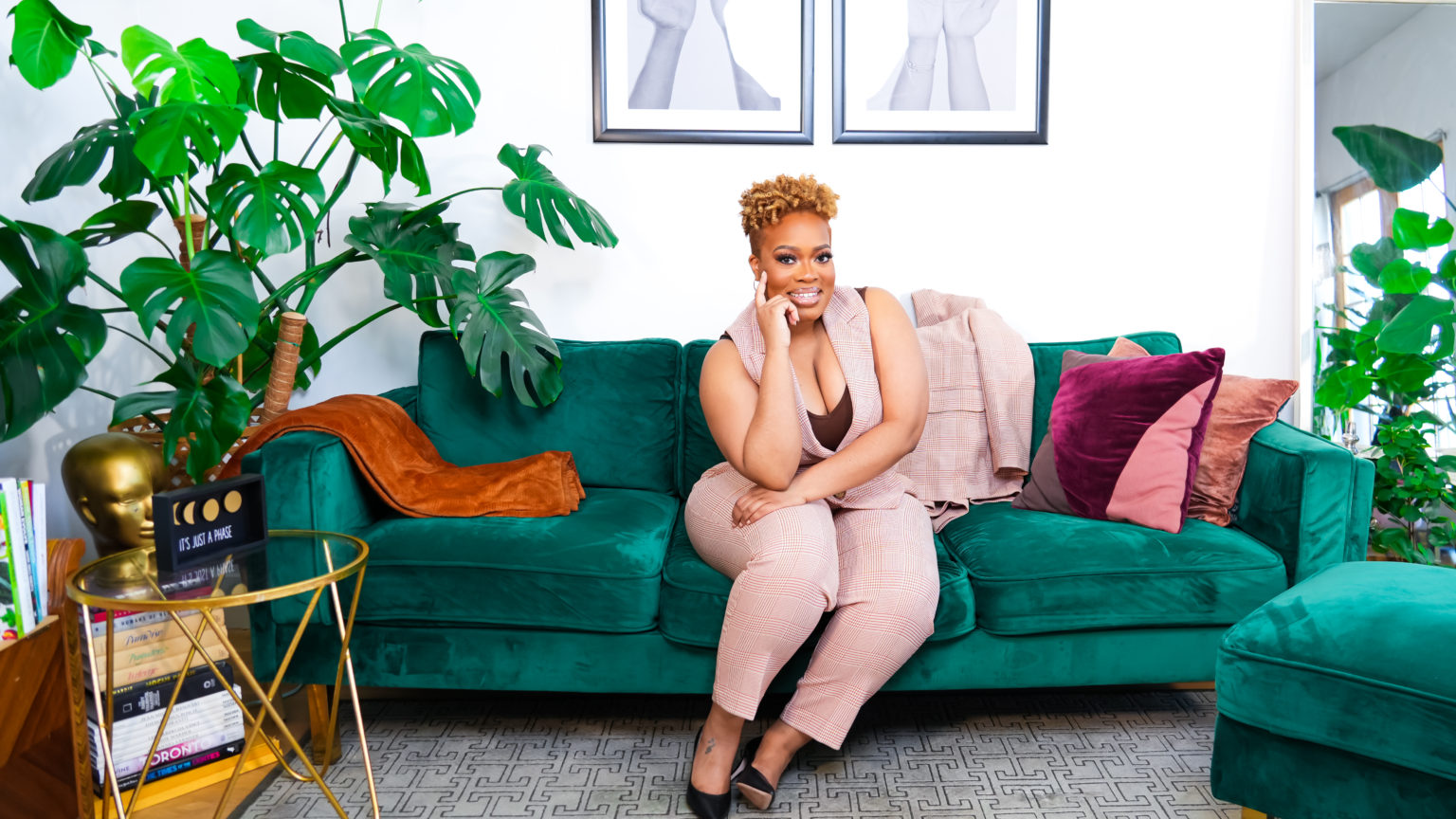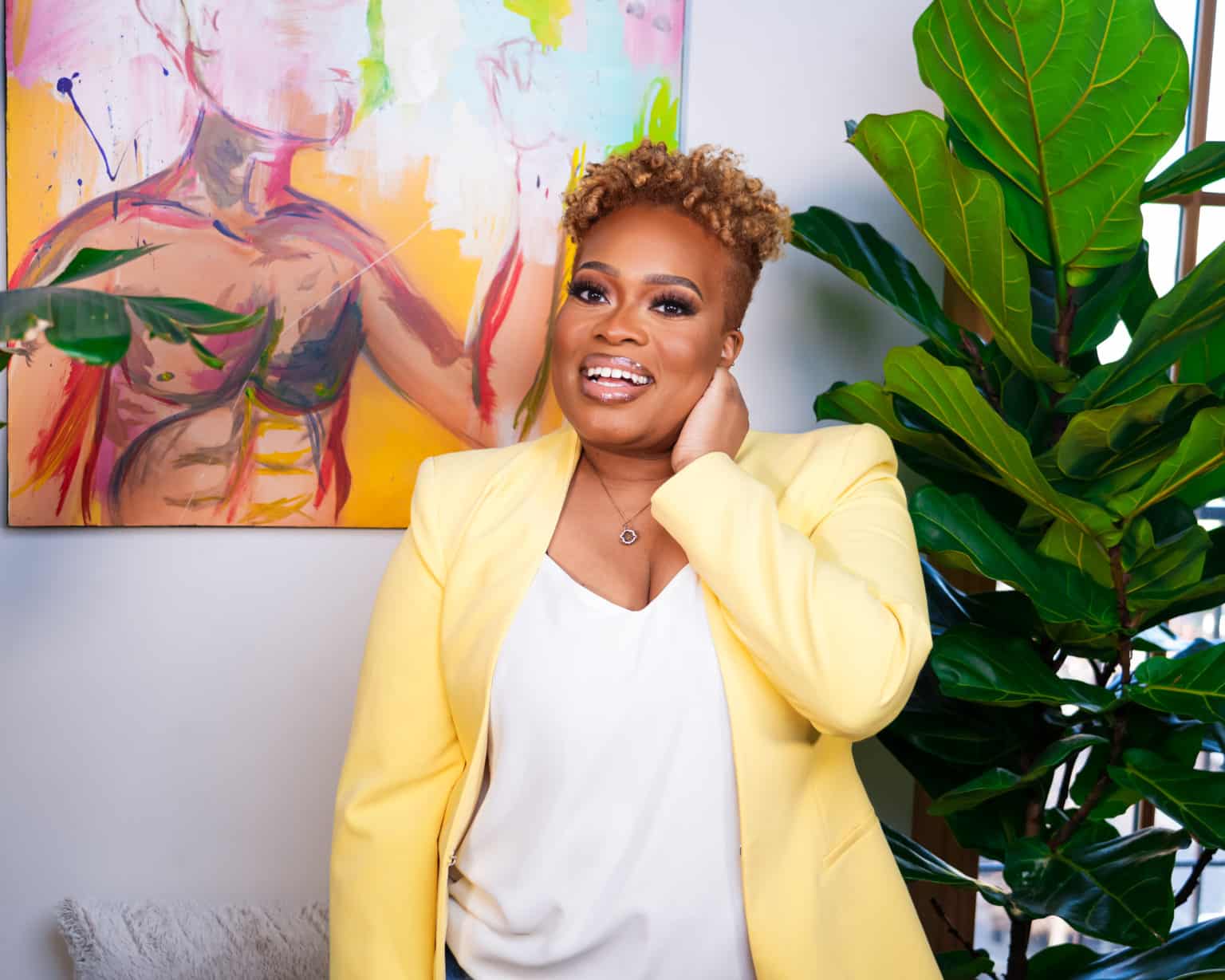
For many women, the journey to an endometriosis diagnosis can be fraught with challenges. Research indicates that for one in 10 women, endometriosis is not only painful but also life-altering. Additionally, up to fifty percent of these women face another heart-wrenching issue: infertility. These startling statistics are even more significant when it comes to Black women.
RELATED: 5 Concerns Black Women With an Endometriosis Diagnosis Face – And What to Do!
A Decade on Hold
On average, it takes eight to 10 years to be diagnosed with endometriosis.
This type of delayed diagnosis is one April Christina knows well, despite her ongoing pleas for doctors to acknowledge her symptoms—an experience that took over a decade for her to receive an accurate diagnosis.
“I was officially diagnosed with endometriosis in my late 20s. I had my first menstrual cycle when I was nine years old,” April Christina tells BlackDoctor.org.
Throughout these years, April Christina faced debilitating symptoms that profoundly affected her childhood and adolescence.
“…It was very challenging. Trying to navigate that at the same time while trying to move around with friends. I used to have to get back and forth from recess because I had to frequently change my sanitary pad because my flow was still heavy, and I was nauseous quite often, dizzy at times, and had bad pain and a lot of leg pain, and weakness,” April Christina adds.
From the age of nine until her teenage years, April Christina had a pediatric gynecologist who prescribed her oral contraceptives to help manage the nausea and debilitating pain she experienced. However, once April Christina entered her 20s, she frequently had to switch oral contraceptives due to experiencing breakthrough bleeding.
At that point, April Christina began to realize that these symptoms may be the underlying cause of something far more serious.
While working in healthcare, a conversation with one patient proved to be pivotal, prompting April Christina to seek medical advice.
“She said that she felt that I had endometriosis. So in my 20s, I officially got an exploratory laparoscopy, a definitive diagnosis to be able to determine if you have endometriosis, and that was when they found out that I had stage 4 endometriosis,” April Christina shares.
The sense of being disregarded by healthcare professionals that April Christina experienced mirrors the sentiments of many Black women, who are often gaslit by doctors.
“I was constantly going to the doctor. Unfortunately, I was going to the wrong physicians,” April Christina notes, adding that she has seen a pulmonologist throughout her childhood and also has thyroid issues, which ultimately led to her delayed diagnosis.
“What I experienced was that often, when I went to my gynecologists, it was just, ‘Okay, regarding the thyroid nodules, they’re not going away, so we’re monitoring the thyroid,’ rather than really looking a little bit deeper into what else could possibly be happening or considering anything else in conjunction with my thyroid that could be contributing to my symptoms,” April Christina adds. “It takes on average eight to ten years to be diagnosed with endometriosis, but because I also have significant leg pain in addition to the endometriosis, it took quite a bit longer. This was because my plan of care was primarily focused on the thyroid instead of investigating something deeper. Which goes back to why I spoke to a urogynecologist (UroGYN), because at that point, I was so desperate, and I just wanted another opinion.”

Advocacy in Action
Driven by her own experiences, April Christina has become a vocal advocate for healthcare awareness.
“The greatest information and advice that I got when I was on my journey, and that’s something that I continue to tell people, is to get a second opinion, sometimes a third, sometimes a fourth opinion, and to utterly use that need until finding not only the answer that you need, but one that you feel comfortable with regarding the quality of care you’re receiving and also with the physician you’re seeing,” April Christina advises.
One effective tool that aided her on her journey was Facebook.
“I was searching for ‘African American doctors’ or ‘gynecological doctors in New York,’ ‘gynecological doctors in Long Island.’ And then once I got in the group, I started searching using hashtags like #stagefourendometriosis, #endometriosis, and #fibroidproblems, and similar terms, just to see what other people had said,” April Christina shares.
Gathering that type of information allowed her to start her own research on physicians.
“That was very beneficial and influential in finding the doctors I have today,” April Christina says. “My first OB-GYN, she ended up retiring, but I’m forever grateful for her because she was the first person who laid that foundation and made me feel comfortable getting a second opinion, and that’s what allowed me to continue to feel more comfortable with my plan of care and with the physician I had after that. That also made me feel it was important for me to advocate upwards in a Facebook group of people who look like me to let them know, ‘I’ve been on that journey too, and this is what helped me.’”
Navigating an endometriosis diagnosis can be a difficult journey for those who wish to start a family. According to Massachusetts General Hospital, 30-50 percent of individuals with endometriosis may experience infertility.
“When I had first started on this journey… I automatically went to a fertility specialist. Now, that’s not something that I know that normal people would think about doing,” April Christina notes. “You just think that you can conceive the conventional way. You’re not thinking about your fertility options. But looking up new research into endometriosis, it is one of the potential issues we need to deal with… So I went to a fertility specialist on my 30th birthday…just to give me peace of mind to really see what my next steps would be.”
RELATED: Coping with an Endometriosis Diagnosis: 7 Ways to Ease the Pain

The Road Through Infertility
Initially, April Christina was informed that her fertility was fine, but this assessment soon changed.
“My ovarian reserve was very low, and that’s when I was officially diagnosed with infertility during the pandemic. It was definitely a journey. Being diagnosed with infertility during such an uncertain time added even more stress. Not only was there uncertainty in the fertility space, but globally as well,” April Christina adds.
Throughout this difficult time, April Christina found support through a fertility coach she connected with online – a Black woman who had also navigated IVF (In vitro fertilization). This connection underscored the importance of culturally competent support in healthcare.
“I didn’t realize how important it was to have someone who could provide not just emotional and mental support, but who also had medical knowledge as a registered nurse, and who had personally gone through IVF herself,” April Christina shares. “She was also an African American woman, so it felt like it was meant to be. To this day, I’m still so thankful for her. She’s become one of my closest friends in the fertility community. Even though she lives in New York and I’m somewhere else, we really connected.”
April Christina’s experience also led her to collaborate with Fertility Out Loud, a platform providing crucial resources and tools, including fertility coaching, to help individuals on their fertility journey.
“Fertility Out Loud came on the scene during the pandemic with incredible resources and tools. Not only could you find specialists in your area, but now they even offer text-based support and fertility coaching. That kind of human connection is one of the most valuable things anyone can have on a fertility journey,” April Christina notes. “There are highs and lows on social media, and I wasn’t sure I’d find someone who truly understood me. But having access to that platform and the tools they offered helped me channel my emotions and experiences in a positive way. Fertility Out Loud has truly been an amazing resource to have during this journey.”
Sharing her story with her community has also been extremely therapeutic for April Christina.
“…There are so many things happening that I wasn’t prepared for. Honestly, I wasn’t ready until I was in the thick of it. I thought the thing I’d be most nervous about would be the injections, because I mean, who really prepares for that? But once I started, the emotional toll and the mental strength required became more overwhelming than anything physical I had anticipated,” April Christina adds. “What made it easier for me was that I created a group — I made 60- to 90-second video blogs for my close friends and family and sent them in a group chat. It helped them understand what I was going through in real-time, and it made communication much easier…”
By sharing her journey, April Christina felt relieved of the shame and emotions she had been experiencing. “It helped me own my experience and move through it with more clarity and support,” she says.
Looking ahead, April Christina’s advocacy work with Fertility Out Loud and other endeavors aims to bring about much-needed changes in how endometriosis and infertility are addressed, particularly for Black women.
“Dealing with this type of pain, especially because the symptoms are invisible, was really challenging. On the outside, I may look completely fine, like I’m feeling 100%… But on the inside, I’m not. And sometimes that disconnect can really mess with your head. You start questioning yourself — Am I really okay? Is something else going on,” April Christina notes.
RELATED: Endometriosis Diagnosis? 6 Exercises EVERY Black Woman Should Try
Her final advice to other women navigating an endometriosis diagnosis is:
- Document everything. “Not only does it help you, but it also helps your doctor better understand and pinpoint what’s going on. Once I started tracking consistently, and I worked with the right care team, we began noticing patterns — certain symptoms flaring up at the same time each month, even when there were no obvious mental health triggers.”
- Understand that your journey may look different. “I was eventually diagnosed with stage 4 endometriosis. But even though it was a severe diagnosis, my symptoms didn’t always match what others were experiencing. And that’s okay. Everyone’s experience is different — and I want people to feel validated in their own journey, no matter where they are or what their symptoms look like.”
- Journal/track your symptoms. “Journaling and tracking symptoms helped me start to see patterns. It allowed me to feel more in control and stay one step ahead. Endometriosis flares can happen randomly, and sometimes it feels like your abdomen is swelling so much that it gives the appearance of pregnancy. So it’s helpful to identify what tools or comforts work for you during those times.”
- Find things that bring you comfort and joy. “For me, using a heating pad helped a lot. Sometimes I’d lie down and watch mindless TV — just something to take my mind off the pain. It’s really about finding what works for you. And you might not get it right the first time. It’s trial and error. But the key is to be patient with yourself.”









